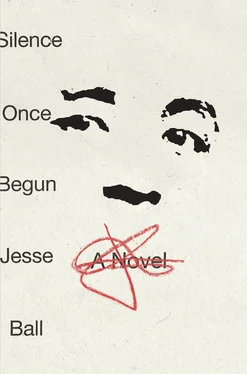The music in the bar was loud. Oda Sotatsu’s life was difficult and had not yielded to him the things he had hoped for. He liked and respected both Kakuzo and Joo and they were bent entirely on him, and on his doing of this thing.
This is how it turned out: Oda Sotatsu wagered with Sato Kakuzo. He lost the wager. He took a pen and he signed the confession, there on the table. Joo took it with her and she and Kakuzo left the bar. Oda went home to his small apartment. Whether he slept or not, we do not know.
According to His Landlady, the Next Morning
everyone in Oda Sotatsu’s building woke up to a forceful knocking on the door of Oda Sotatsu’s apartment. When he did not get to the door quickly enough, the door was broken down. When he did not get onto the ground quickly enough, he was thrown to the ground. Handcuffed and in great distress, he was removed and taken to a van. A witness I spoke to said he did not struggle or declare his innocence. He merely went along quietly. The landlady recalls that he was not wearing a jacket.
The Daughter of Oda’s Landlady
related to me:
— You can know nothing about Oda if you do not know how kind he was and how the kindness that he was and had was in his body, really. It was not a thing of thinking or deciding. He was simply kind and did the right things many times. To show you how — I was not old enough, but my mother, she told me that when the woman who lived above him, an old woman, and he was young, Oda, maybe in his early twenties, this old woman she had some kind of furniture moved into her house. The furniture was too large for the door and it got stuck in the door and the movers had to do something with it. It was late in the day. The workday was finished. They would come back in the morning. But the old lady, she could not go in or out. She was very concerned. She was there by the door trying to peer out through whatever little holes were left. She kept saying things, all kinds of things, but the workmen had already gone. So, Oda, what does he do? He goes up there with a little lamp and he sits on one side of the door and he talks to the old woman the whole night, doesn’t leave until the morning. You know, I don’t think he even liked her. He was just that way. A kind boy. Matter of fact, no one liked that old woman.
I am trying to relate to you a tragedy. I am attempting to do so in the manner least prejudicial to the people involved, those people who were survivors of the tragedy, but also the agents of it.
Oda Sotatsu signed a confession. He did not clearly understand what he was doing, perhaps. Or perhaps he did. Nonetheless, he signed it. The next day, Saturday the fifteenth, he was dragged off to jail. Because of the comprehensive nature of the document, the confession, his guilt was never in any doubt. The trial, when it happened, was a rapid affair in which Oda Sotatsu did little, certainly nothing on his own behalf. The police attempted, over the course of the time he was in jail awaiting trial, and the time when he was on death row thereafter, to get him to speak about the crimes he had confessed. He would not. He carried a sort of tent of silence with him, and out of it he refused to come.
Oda was visited many times during the next months by Joo. He never saw Kakuzo again.
Our story continues with information related to me by officers, guards, priests, journalists (present at the time), and by the Oda family. This is how Oda Sotatsu’s story is told.
Seven Months of Confinement
Fifteenth of October, 1977. Oda Sotatsu brought in on suspicion of participation in the Narito Disappearances. This suspicion having to do with the confession signed by Oda, submitted to the police force anonymously. Conversation conducted in a room of the local police station. Inspector Nagano and another inspector, name unrecorded.
[ Int. note . Transcript of session recording, possibly altered or shoddily made. Original recording not heard.]

OFFICER 1
Mr. Oda. I assume you know why you are here. I assume you know why we took the trouble to bring you here, and I assume you know what the penalties are for lying to us.
OFFICER 2
Mr. Oda, if you have any information about the whereabouts of the individuals mentioned in your confession, or if you know any of them to still be living, tell us now. It could help your case greatly, such information.
OFFICER 1
We have read your confession. We are very interested in obtaining more information pertaining to it as soon as possible.
ODA
(silent)
OFFICER 1
Mr. Oda, your predicament is not enviable. I can assure you, it is almost certain that if you are convicted you will be taken to an execution room in X. prison and hanged. If any of the individuals mentioned in your confession are still living, and you cooperate with us to find them, it could help you. It could make the difference. You could live.
ODA
(silent)
OFFICER 2
If you think being silent is going to help you. If you think that.
OFFICER 1
If you think that, you don’t know anything about this.
OFFICER 2
Maybe you got into this the wrong way. Maybe you think you know the way out. But you don’t. The only way out is to help us.
OFFICER 1
Tell us where these individuals are. That’s your play. That’s your way out.
OFFICER 2
Not to freedom.
(Officers laugh.)
OFFICER 1
No, just out — a way to avoid the execution room.
OFFICER 2
And not just that, but even now. Even now, things can be better than they are. They don’t have to be like this. There are, you can believe, better cells in the jail than the one you have. There is better food than the food you’ll get. There’s even, I shouldn’t say this, but it could be arranged for you to go from here to a regular jail. Things are different there. Maybe better for you? There are even different guards. Things aren’t all the same. You can improve your situation, that’s what we’re saying.
OFFICER 1
We’re not your enemies. You don’t have any. We’re all just working together. We’re all cooperating. Inspector Nagano and I are going to leave the room now. When we come back tomorrow I want you to have things to say to us. Do you understand?
[ Int. note . When I visited the village, years after, I managed to conduct a series of interviews with the Oda family. It was difficult to get into contact with them, but as I have told you, I had my own reasons for trying. I had been in Japan only briefly before, and many things were new to me. I felt a beautiful feeling of opening, as though everything was expanding and sharpening, becoming larger and clearer than it had been, just as on a cloudy day, sometimes the light shifts and becomes strong when one is not even directly in sunlight. Various portions of these interviews I here include in order to show the progression of Oda Sotatsu’s incarceration. I will explain it precisely, piece by piece, presenting you the evidence as I received it. The house in which I conducted the interviews was a rented house on a property known to be full of butterflies in certain seasons. At the time in which I arrived, and when I began the interviews, there were no butterflies evident. However, when we sat in the north room of the house, where Sotatsu’s mother most often chose to be interviewed, she spoke of having visited the house under other circumstances, and of having seen the butterflies. For me, it was as though I had then seen them, and later, when they did indeed come, it was exactly as she had said. I say this only to give a sense of her reliability, although, clearly, a matter of insects and the matter of her son’s confession are not really alike, not really. Still, the impression of exactitude remains, and so I explain it.]
Читать дальше













